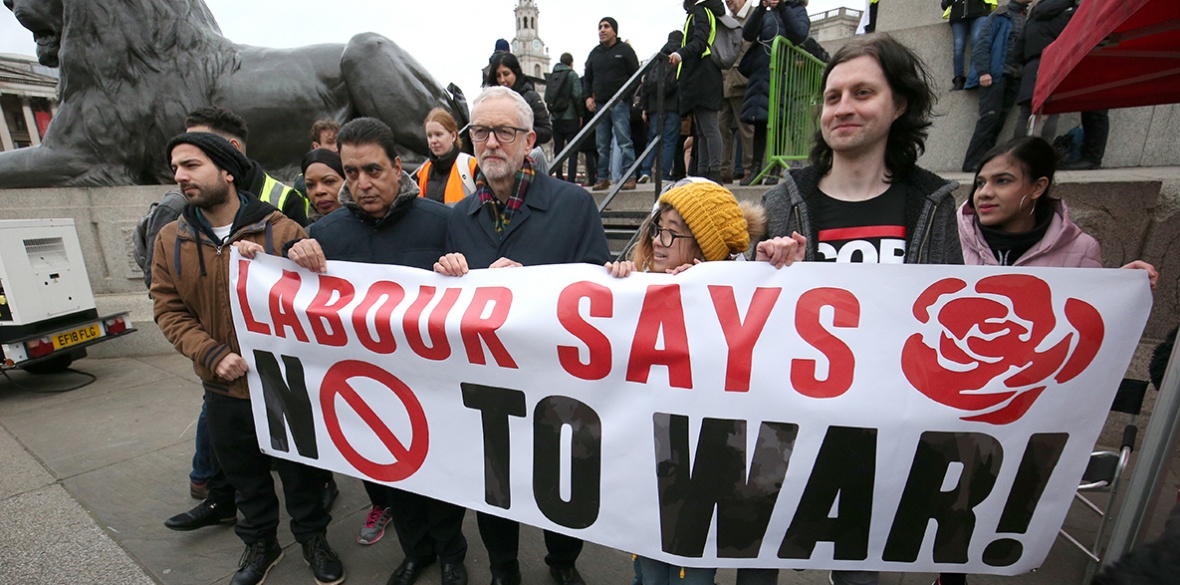This is the last article you can read this month
You can read more article this month
You can read more articles this month
Sorry your limit is up for this month
Reset on:
Please help support the Morning Star by subscribing here
THE decision by the International Criminal Court (ICC) to drop a probe into alleged war crimes by British troops in Iraq comes at a key moment for the anti-imperialist left.
Human Rights Day, which commemorates the United Nations’ adoption of the Universal Declaration of Human Rights (UDHR) on December 10 1948, is being used to relaunch the doctrine of “humanitarian intervention,” with shadow foreign secretary Lisa Nandy attending the launch of Dr Harry Pitts and Professor Paul Thompson’s pamphlet A Progressive Foreign Policy for New Times.
Given that 2020 has been dominated by a pandemic that has claimed more than a million-and-a-half lives, Human Rights Day could have been marked by campaigning on UDHR Article 25, which sets out the human right to healthcare: denied in countries like the United States and threatened here by corporate profiteers.
Or, given the tsunami of job losses sweeping the country, Article 23 on the right to work might merit attention.
But these social rights have never been popular with capitalist states, and Labour instead uses the day to formalise the rejection of the anti-imperialist politics of its previous leader, Jeremy Corbyn.
So we should be clear: ICC prosecutor Fatou Bensouda is not giving the British Army a clean bill of health when it comes to war crimes in Iraq. Indeed, she found there was “a reasonable basis to believe that in 2003 British soldiers in Iraq carried out the war crime of wilful killing or murder against at least seven Iraqi detainees.”
Holding accountable those responsible for war crimes is about more than delivering justice for the victims. It is more important even than motivating armed forces to abide by international law.
Exposure of the terrible reality of war is the most powerful of all anti-war arguments. War is not, and cannot be, a “civilised” business. War means war crimes. Indeed, as the Nuremberg trials established, starting a war is itself the worst war crime of all.
It was an understanding of this that made Corbyn so terrifying an adversary to the British Establishment, especially after his speech following the Manchester Arena bombing in 2017 showed that the public were receptive to arguments drawing the connection between funding and waging war and international terrorism.
Labour’s foreign-policy relaunch is nothing but an attempt to rehabilitate war. Thompson and Pitts sniff that “the ‘anti-imperialism’ of the last Labour leadership has little to offer” and dismiss cases in which Corbyn has been dramatically vindicated – such as over Iraq – as serendipitous, the result of “unbending principles that ... occasionally [place] adherents on the right side of events like Iraq.”
The unprovoked destruction of an entire country is not a crime in this narrative – it is an “event” – and anti-war campaigners deserve no credit for having fought to prevent it.
Indeed, the left is accused of “condemning the West and condoning ‘the rest’,” a common snipe from armchair warmongers and an entirely misleading one. It is Corbyn, with his “unbending principles,” who has an honourable record of calling out human-rights abuses wherever they occur, including incidentally in Russia and Iran, though you would not know it from the mass media.
It is the pro-war Establishment that ascribes human-rights abuses only to “the enemy camp” and presents the United States and its allies as the global “good guys.”
The inauguration of a less egregiously offensive US president is seen by Labour’s leaders as a chance to reject the peace movement and slap a new coat of paint on a “special relationship” that consists of Britain placing its military at the disposal of the United States.
The horrific carnage inflicted on Yugoslavia, Afghanistan, Iraq and Libya is reason enough to resist this trend. In an age when US-China relations are being stretched to breaking point, the anti-war movement should be at the heart of all left politics.











